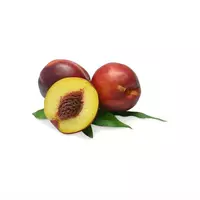Nectarine

Many people wonder - what is nectarine? Nectartin is a type of peach that is native to China. Nectarine is a bare peach, an extremely poplar fruit around the world. The fruits of nectarin are beautiful and large, its taste is sweeter than the taste of an ordinary peach, although the two fruits are largely similar in composition.
The benefits of nectarine
Nectarine contains a large amount of provitamin A, vitamin C, potassium, phosphorus, iron, as well as fiber and fructose. Such a rich composition is due to the useful properties of nectarin. First of all, the use of nectarines in food contributes to the prevention and treatment of hypertension and atherosclerosis. Pectins, which are part of nectarin, have a unique effect and help the body fight cancer.
The benefits of nectarin have also been proven for the digestive system. Nectarines have a very, very beneficial effect on the activity of the gastrointestinal tract, normalize digestive processes, restore metabolism. The benefits of nectarine are invaluable for the skin. Nectarines return its elasticity, prevent the appearance of wrinkles, preserve moisture in the cells of the skin, relieving it of dryness.
Vitamin C, generously contained in nectarine, participates in almost all metabolic processes of the body. Thanks to it, nectarin acquires an effective anti-inflammatory effect. Nectarin is perfectly absorbed by the body, quickly returns the lost physical strength, increases the general tone of the body, raises the mood.
Nectarin has a positive effect on the cardiovascular system, as it contributes to the elimination of harmful cholesterol from the body. Nectarin has high antimicrobial activity, its use helps in the fight against many harmful microorganisms.
Nectarine is remarkable when fresh, but is also beautifully preserved. The calorie content of nectarine is 44 kcal. 100 gr. , which allows you to talk about it as a wonderful dietary product. Very often nectarin can be found in dried form, while it does not lose its taste and nutritional properties. Jam, jams are prepared from nectarine, baked and frozen.
Nectarine ossicles are also widely used. They are similar in taste and properties to almonds, so they are often present in various confectionery products as a very tasty, fragrant and useful additive. No less tasty and useful is nectarine juice. It is recommended to use it for heart rhythm disorders, for low blood, as well as for increased acidity of gastric juice and constipation.
Harm to nectarine
The harm of nectarine affects people suffering from diseases such as diabetes mellitus, obesity, as well as with a tendency to allergic reactions. In these cases, nectarin is better excluded from the diet.
Nectarine 44 kCal
Energy value of nectarin (Ratio of proteins, fats, carbohydrates - ju):
Proteins: 1.06 (~ 4 kCal)
Fats: 0.32 g (~ 3 kCal)
Carbohydrates: 8.85g (~ 35kCal)
Energy ratio (bj | y): 10% | 7% | 80%
 Español
Español Français
Français Português
Português Русский
Русский 简体中文
简体中文 繁體中文
繁體中文 日本語
日本語 한국어
한국어 العربية
العربية Türkçe
Türkçe Қазақ
Қазақ Deutsch
Deutsch Italiano
Italiano Українська
Українська
